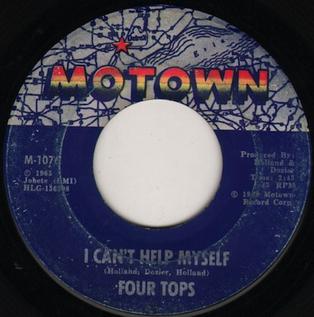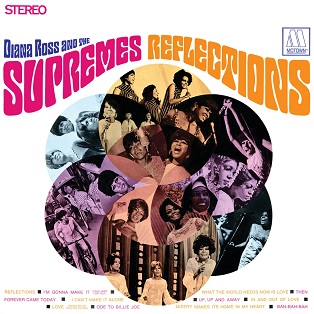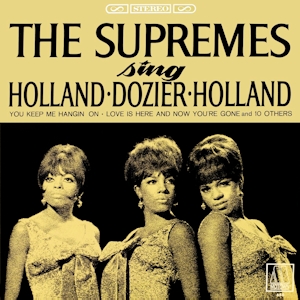
"Stop! In the Name of Love" is a 1965 song recorded by the Supremes for the Motown label.

"Reflections" is a 1967 song recorded by The Supremes for the Motown label. It was the first Supremes record credited to "Diana Ross and the Supremes", and among their last hit singles to be written and produced by Holland–Dozier–Holland (H–D–H), Motown's main production team.

"Come See About Me" is a 1964 song recorded by the Supremes for the Motown label. The track opens with a fade-in, marking one of the first times the technique had been used on a studio recording.

"Love Child" is a 1968 song released by the Motown label for Diana Ross & the Supremes. The second single and title track from their album Love Child, it became the Supremes' 11th number-one single in the United States, where it sold 500,000 copies in its first week and 2 million copies by year's end.

"I Hear a Symphony" is a 1965 song recorded by the Supremes for the Motown label.

The Andantes were an American female session group for the Motown record label during the 1960s. Composed of Jackie Hicks, Marlene Barrow, and Louvain Demps, the group sang background vocals on numerous Motown recordings, including songs by Martha Reeves & the Vandellas, the Temptations, Stevie Wonder, the Four Tops, Jimmy Ruffin, Edwin Starr, the Supremes, the Marvelettes, Marvin Gaye and the Isley Brothers, among others. It is estimated they appeared on 20,000 recordings.

The Supremes A' Go-Go is the ninth studio album released by Motown singing group the Supremes. It was the first album by an all-female group to reach number-one on the Billboard 200 album charts in the United States.

"I Can't Help Myself" is a 1965 song recorded by the Four Tops for the Motown label.

Reflections is the twelfth studio album recorded for Motown by Diana Ross & the Supremes. Released in 1968, it was the first regular studio LP to display the new billing of the group formerly known as "The Supremes." It contains the singles "Reflections", "In and Out of Love" and "Forever Came Today". Also included are covers of songs made famous by Martha and the Vandellas and The 5th Dimension. Also present are songs written by other famous names, including "Bah-Bah-Bah" co-written by Motown singer Brenda Holloway with her younger sister, Patrice, an original Smokey Robinson composition titled "Then", and "What the World Needs Now Is Love" by Burt Bacharach and Hal David, which Motown planned to release as a single in the spring of 1968, but cancelled. It also contains a cover of Bobbie Gentry's "Ode to Billie Joe," whose original recording kept the single #2 "Reflections" from peaking at the top spot on the Billboard Hot 100 in September 1967, and it hit #2 on Cashbox.

"Love Is Here and Now You're Gone" is a 1967 song recorded by the Supremes for the Motown label.

The Supremes Sing Holland–Dozier–Holland is the tenth studio album released by The Supremes for Motown in 1967. It includes the number-one hit singles "You Keep Me Hangin' On" and "Love Is Here and Now You're Gone". As the title states: all songs on the album were written and produced by Motown's main songwriting team of Holland–Dozier–Holland. Most of the album was recorded during the spring and summer of 1966; however several songs date back to the summer of 1964.
"Quicksand" is a song recorded by the Motown girl group Martha and the Vandellas. It was written by the songwriting team of Holland-Dozier-Holland and released as a single in November 1963.

"Forever Came Today" is a 1968 song written and produced by the Motown collective of Holland–Dozier–Holland, and was first made into a hit as a single for Diana Ross & the Supremes in early 1968. A disco version of the song was released as a single seven years later by Motown group the Jackson 5.
"A Breathtaking Guy" is a 1963 song written and produced by Smokey Robinson and released first by Motown singing group The Supremes (1963) and later by The Marvelettes (1972). The single was originally released under the title "A Breath Taking, First Sight Soul Shaking, One Night Love Making, Next Day Heartbreaking Guy" by The Supremes, but was shortened after its official release. All three Supremes members - Diana Ross, Florence Ballard and Mary Wilson - sang the chorus with the original title together.

"When the Lovelight Starts Shining Through His Eyes" is a song written by Holland–Dozier–Holland and recorded in 1963 by Motown singing group The Supremes. It is notable as the Supremes' first Billboard Hot 100 Top 40 recording, following seven previous singles between January 1961 and September 1963 which failed to enter the Top 40. The single is also notable as the first Supremes single written and produced by Holland–Dozier–Holland, who had previously created hits for Martha and the Vandellas and Mary Wells.
"Run, Run, Run" is a 1964 song written by Holland–Dozier–Holland and released as a single by Motown singing group The Supremes. After a couple of years of unsuccessful singles, the Supremes had finally broken through with a Top 40 single (23) in December 1963 with "When the Lovelight Starts Shining Through His Eyes". On the heels of its release, Motown rush-released a second HDH single titled "Run, Run, Run". Inspired by the sounds of Phil Spector and his Wall of Sound, it was an attempt to give the Supremes a poppier sound compared to their earlier heavy R&B recordings. Billboard described the song as a "strong follow up" to "When the Lovelight Starts Shining Through His Eyes," stating that it "has tough beat in a middle up groove that's great for dancing." Cash Box described it as "a pulsating, big sounding rocker with some torrid triplet keyboard work backing up."

"Nothing but Heartaches" is a 1965 song recorded by The Supremes for the Motown label.

"In and Out of Love" is a 1967 song recorded by The Supremes for the Motown label. It was the second single issued with the group's new billing of Diana Ross & the Supremes, the penultimate Supremes single written and produced by Motown production team Holland–Dozier–Holland, and the last single to feature the vocals of original member Florence Ballard.

"Where Did Our Love Go" is a 1964 song recorded by American music group the Supremes for the Motown label.
"Too Hurt to Cry, Too Much in Love to Say Goodbye" is a 1963 song and single written and composed by Motown's main production team Holland–Dozier–Holland. Credited to the Darnells, the performers on both sides of the single were the Andantes, Holland–Dozier–Holland, Mary Wilson of the Supremes (B-side), and members of the Marvelettes, the Four Tops, and the Temptations. Nobody involved with the production on either side was pleased with the false credit. The single peaked at number 17 on the Billboard Bubbling Under Hot 100 chart.















